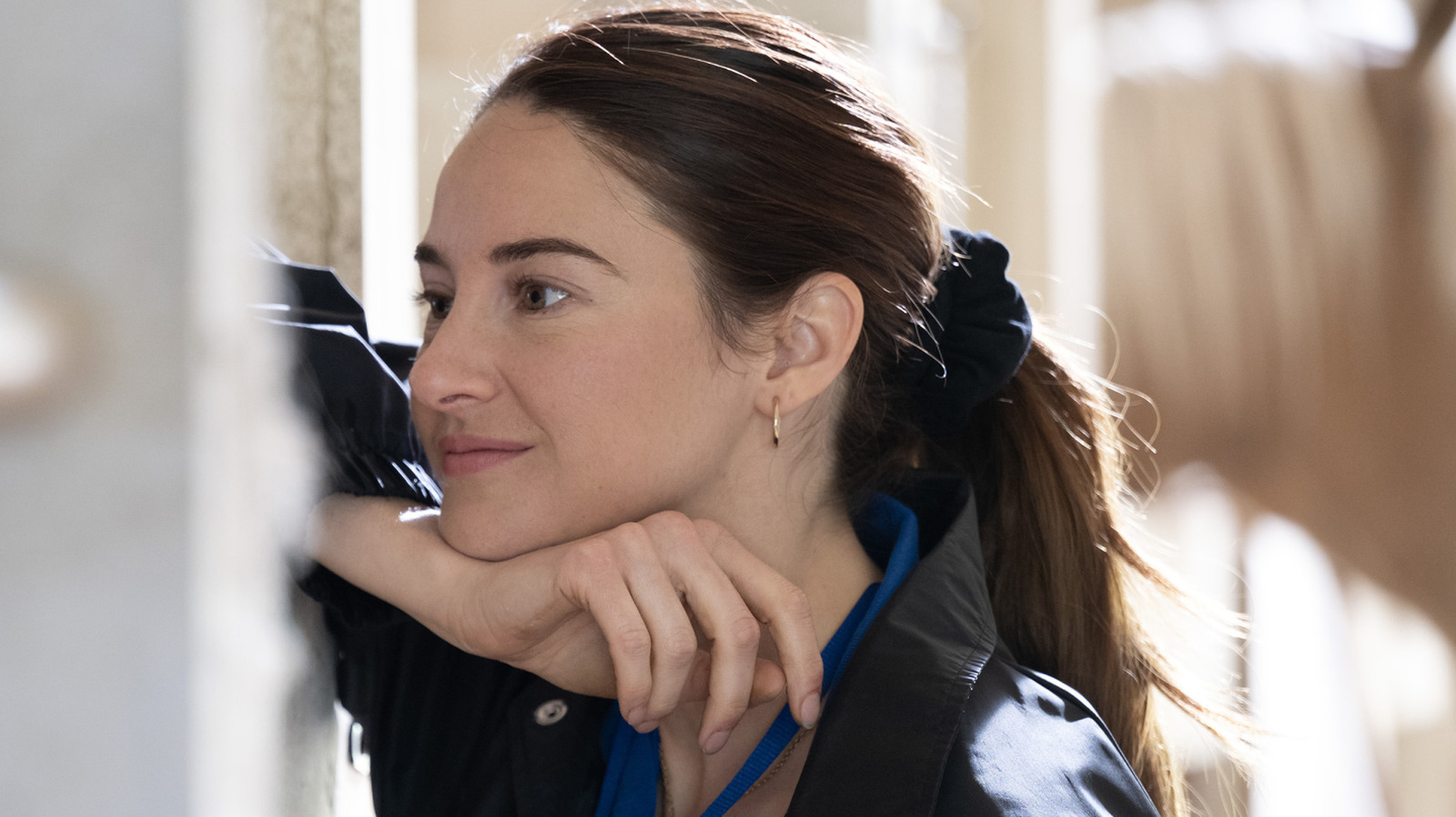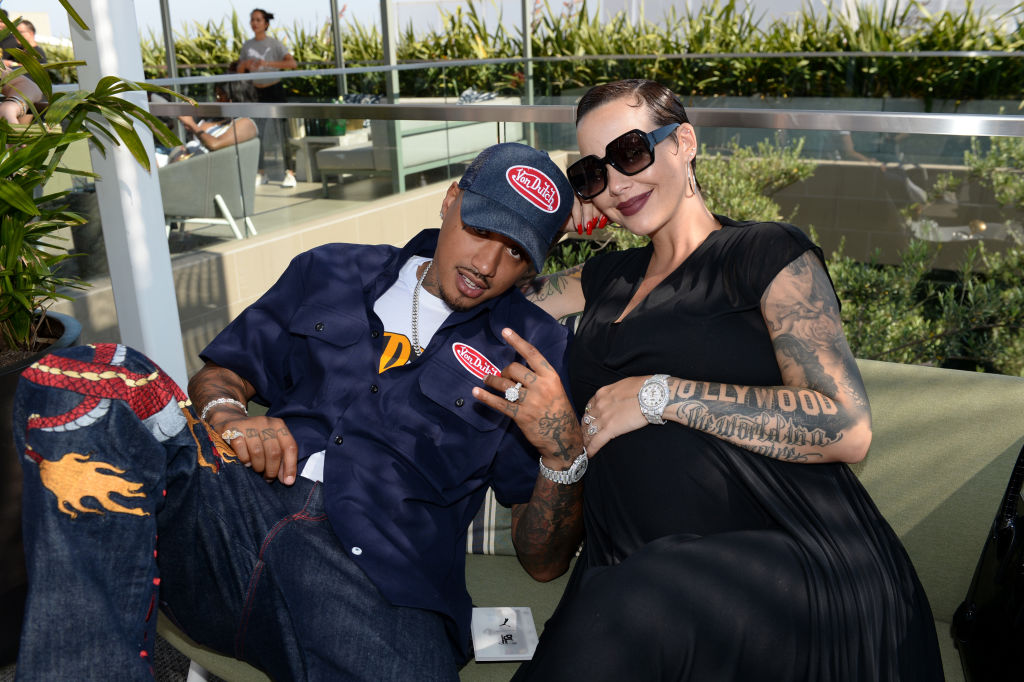Liane Moriarty’s body of work is ripe for TV adaptations, and Peacock’s Apples Never Fall is a perfect illustration of why with a tale so juicy, you’d think it fell right off the tree.
This isn’t your run-of-the-mill adaptation, either. This series is a complete package – a beginning, middle, and an oh-so-satisfying end. It’s like Moriarty handed us the apple pie, not just the apples.
Every character gets their moment in the sun (or should I say spotlight?), evolving right before our very eyes. Talk about character development goals!
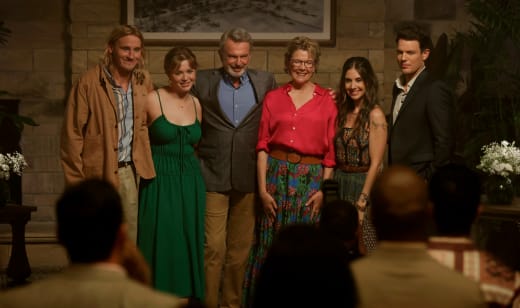
Showrunner and Executive Producer Melanie Marnich says Moriarty captures the essence of love, marriage, and family with raw honesty. “I think she had things to say about the contradictions within love and family, the complexity, the moral complexity within love and family that were just very true.”
Joy and Stan Delaney raised their four children amidst the background of professional tennis; competition is in their blood on the court and in the home.

Apples Never Fall explores what that atmosphere does to a family and their relationships and what happens when the competition on the court passes, and you put down the rackets.
The Delaney family? They’re like the Williams of the suburban tennis world. But what happens when the games end, and life’s real competition begins?
Enter stage left: Georgia Flood as the enigmatic Savannah, shaking things up and challenging the Delaney’s picture-perfect facade.
Flood says, “Savannah comes into the Delaney family, which is seemingly perfect, and just does a little disruption and seeks out Joy’s maternal love; she’s a bit of a change agent.”
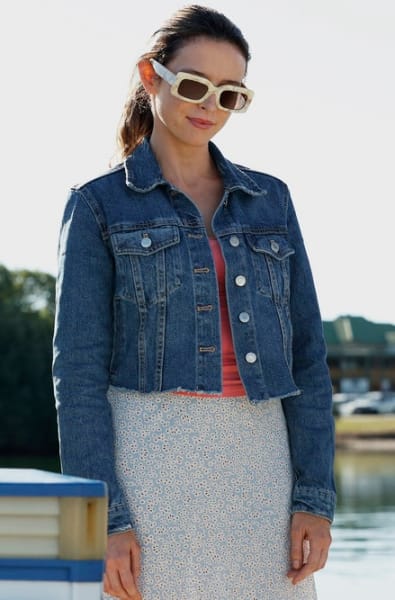
Sam Neill plays Sam Delaney, and we chatted about the series’ blend of comedy and drama, reflecting the messy beauty of real life. He’s captivated by the family dynamics, their struggles, and triumphs, painting a picture of a family that’s anything but cookie-cutter.
Neill says, “From the word go, we know that something bad has happened to Joy, what exactly it is, but the slow reveal of what’s led to that and the consequences, which is the other half of the story, it builds up into something that is very intriguing.
“But it explores the dynamics of a family. And none of us come from the perfect family.
“I know that from experience. Although there’s a lot of love in the room, people are complex because they’re human, and humans are ridiculous and profoundly interesting.

“I love this particular family. It hasn’t been an easy road for them because of Stan’s overbearing character. The glue that sticks them together or unsticks them is a wonderful bit of material.”
The Delaney children are like most; they butt heads hard, and they love as deeply. They may not appreciate or understand each other fully, but they’re devoted.
What’s a family without a little sibling rivalry? Allison Brie and Essie Randles delve into the complexities of sisterhood, with secrets and tensions bubbling under the surface. These sisters aren’t just butting heads – they’re unraveling mysteries and confronting truths.
Brie describes Amy’s sisterly dynamic with Brooke (Randles) as less than stellar. As the eldest sibling, Amy has done a lot of mental and emotional work on herself. “To her, Brooke is such a daddy’s girl, really wants to do right in our parents’ eyes, and is doing herself an injustice by not being her truest self.”

Brie laughs, “I think Amy also thinks Brooke is a little tightly wound and could loosen up a little bit and should tell the truth, as Brooke has been keeping some secrets. They’re pretty dishonest, and they’re nearly sinister.”
Randles interjects with “approaching sinister,” which gives you a vague idea of the relationship between the sisters.
Randles sees Brooke as holding herself to a high standard to please her parents, and Brooke thus views Amy as “almost offensive” for not sharing the same standards. “She sees Amy as a bit of a mess and wants her to be more tightly wound, like her.”
When Savannah firmly implants herself into the Delaney’s world, all of the Delaney siblings are threatened, especially Amy. Brie says, “Look, she’s sleeping in my room. She’s wearing my old clothes. She’s basically single white female-ing me and trying to be my mom’s best pal.

“And I think each of the Delaney sibs has a special and unique relationship with Joy. From Amy’s perspective, Joy is the only person in the family who understands her. And to see Joy giving all this love and attention to Savannah is scary.”
While Savannah comes to the family free of baggage like moldable clay, the Delaney children must compete for their parents’ love without such freedom, which sets up a tornadic environment, spelling disaster.
Randles says, “I think it’s very threatening and a bit destabilizing, the fact that there’s someone just suddenly in our house, sleeping in your room, wearing your clothes. I think it’s pretty weird for us.”
Then there’s the brotherly bond – or battlefield – between Connor Merrigan-Turner’s Logan and Jake Lacy’s Troy. It’s a classic tale of opposites clashing, each brother carving his own path while still tangled in family ties.
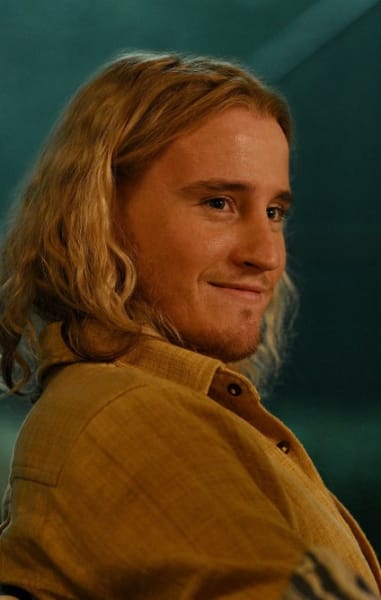
As Logan Merrigan-Turner said of Troy, “He’s a driven man who only sets his standards to the highest point, and then is always continuing to better himself and continue on just evolving as a person, as a business person as well.
“That’s how I, in a compassionate way, view Troy. But as brothers do, they fight, and they do and don’t like each other at times. And Logan can sometimes feel that way towards Troy.”
Lacy, acting as Troy, says, “Logan is adrift, literally is at sea, lives in a houseboat, and needs to pull it together. This was cool when you were 20. What’s up, man? You’re staring down the barrel at 30.
“Let’s do something. I think he’s not even jealous, but I honestly think he’s impressed that his brother fully marches to the beat of his own drum in a way that Troy might like to. It wouldn’t look the same as Logan, but he has really put time and effort into a structured, manicured, considered life.
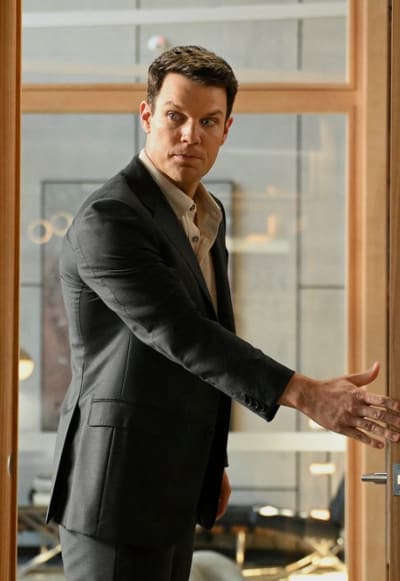
“And it’s not really working out. All the time and attention to making the externals fit isn’t paying off internally. And yet, his brother seems to be at peace with who he is, which is something that really eludes Troy.”
Troy and Logan view Savannah’s threat differently than Amy and Brooke, as you’d expect. Lacy says Jake sees Savannah as a problem to be solved.
“He’s like, ‘You need to go. I don’t know what this is all about, and I don’t really care, but your time here is done.’ It’s also true to Troy; he wants to do it on his terms. His perspective is the right perspective.
“Nobody else sees all the pieces and how they fit together and doesn’t want to rely on his dad to handle this appropriately, his mom to handle it appropriately, his siblings to deal with it.”

Kerrigan-Turner also chose to steer away from Savannah as a threat, suggesting that as an “easy-going, chill guy,” he holds tightly to the family structure. He struggles to capture his dad’s smile and is dismayed when it’s so easy for Savannah.
“The first scene where Logan meets Savannah, dad is just changed. He’s a new man. He’s smiling. He’s got this new way of this attitude and moving in Savannah’s presence. And I’ve never met Savannah. Who is this person? I think that is, I’m going to say, a little threatening.
“I’m like, ‘How did you do something that I’ve been working all my life to try and get? How did you do that in the way that Savannah navigates her way into our family?’ I think that is a little off-putting. This is mine. There’s a real protection of his family, and Savannah’s new addition to it is concerning.”
But let’s not forget the elephant in the room — the mysterious guest in their house. Savannah’s arrival stirs the pot, threatening established dynamics and forcing each Delaney to confront their own insecurities and desires.

When Joy goes missing, it’s not just a mystery; it’s a catalyst, unraveling the tightly wound threads of the Delaney family. Marnich masterfully intertwines personal journeys with the overarching enigma, ensuring that the suspense and family drama enhance each other in a mesmerizing dance.
Marnich explains, “I think the trick was saying the mystery was also the mystery of each character. The only mystery isn’t Joy. I wrote it on the whiteboard in the writer’s room on the first day, and it was, ‘What happened to Joy, and why?’
“And those were two equally important questions, and the ‘And why?’ is each of those characters. What has happened in the relationships and in her absence? What gets uncorked in each of those characters?”
“Each mystery of each character is deeply profound and all intertwined. I think what really made a huge difference was saying, ‘Okay, each episode front burners one of those characters. Even though it’s an ensemble drama, you can’t service everybody equally all the time. Otherwise, it’s a mess.’”
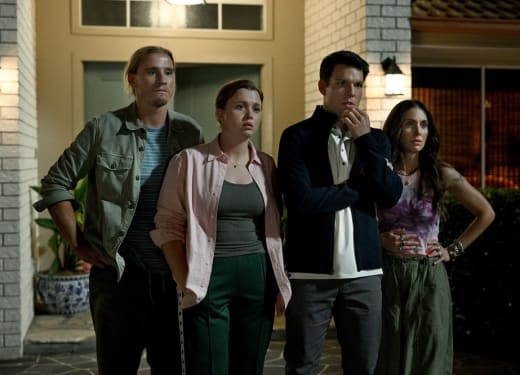
In response, the team used an episode for every character, doing a deep dive into each to learn not just about the mystery and how it occurred but to uncover the secrets the family held dear that must be exposed for them to find their way back to each other.
Key to every aspect of Apples Never Fall is Neill’s Stan Delaney, a man whose dreams of being the tennis coach to the stars disappeared in a puff of smoke.
Neill explains Stan’s predicament. “I think there’s a great deal of pride in what he’s done but also a sense of disappointment that it hasn’t been quite as successful a life as he would’ve liked it to have been.”
He finds the characters very relatable and recognizable. What’s difficult is to pinpoint how any of them view themselves. How do any of us assess ourselves in that regard?
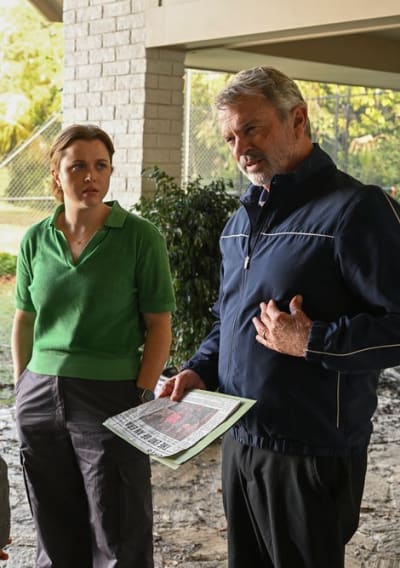
“Stan is nothing if not complex. He is a difficult man to like, but on the other hand, the more you get to know him, the more vulnerable and hilarious he is as well,” Neill says.
He also admits that Stan is capable of anything, bordering on dangerous. He was thrilled to have seven hours to explore the character, slowly revealing the family’s complexities and unraveling Stan’s secrets.
As is often the case when someone disappears, the spouse is high on the list of suspects for wrongdoing. Stan doesn’t do himself any favors. As a “difficult, often angry man,” it’s hard to tell if he’s frustrated at the situation, mourning the loss of his wife, or if he has something to hide.
“He’s a difficult guy to read, and that enigma is intrinsic to the mystery itself,” Neill says.

Marnich couldn’t be more thrilled to have landed such a capable and talented cast, and she enjoyed seeing them bloom together as much as her characters on the page.
“The show is tonally complex,” Marnich says. “There’s a really interesting trick to juggling a suspenseful mystery that’s quite harrowing, family drama, and the funny. And to braid those three things together in a way that feels not writerly, but authentic and human was a trick.”
“Finding a cast to seamlessly flow between those tones and make them quite holistic” was a feat in itself, but the actors nailed the authenticity and tone of the material to make the production utterly engaging from start to finish.
If the Delaney family has a fatal flaw, Marnich says it’s that “competition is in their blood, and they didn’t when to let go of it.”
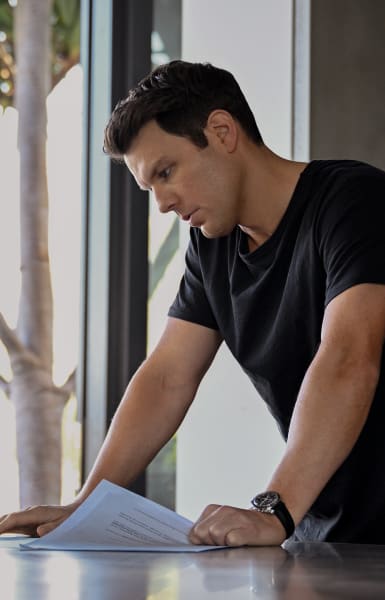
Ultimately, this isn’t just a story about solving a disappearance; it’s about a family confronting their past, their failures, and each other. It’s about learning to let go, moving forward, and finding joy – both figuratively and literally.
Don’t miss this incredible cast as they weave a rich tapestry of complex relationships and moral quandaries.
Mark your calendars, set your reminders, and prepare for a binge-worthy adventure. Apples Never Fall hits Peacock this Thursday, March 14, and trust me, you won’t want to miss a single minute.
Edit Delete
Carissa Pavlica is the managing editor and a staff writer and critic for TV Fanatic. She’s a member of the Critic’s Choice Association, enjoys mentoring writers, conversing with cats, and passionately discussing the nuances of television and film with anyone who will listen. Follow her on X and email her here at TV Fanatic.



